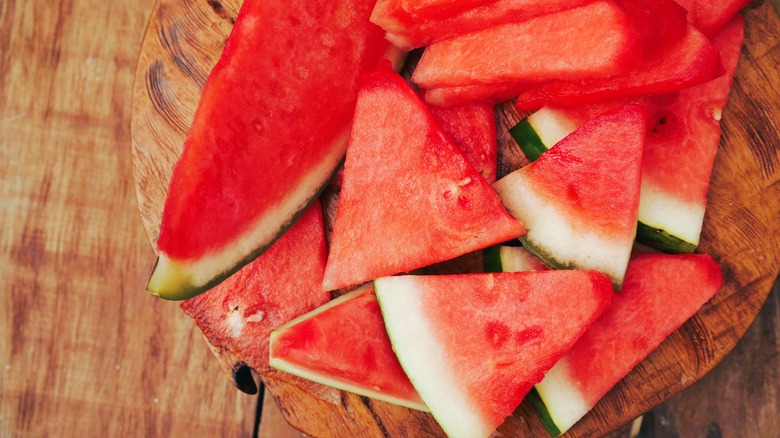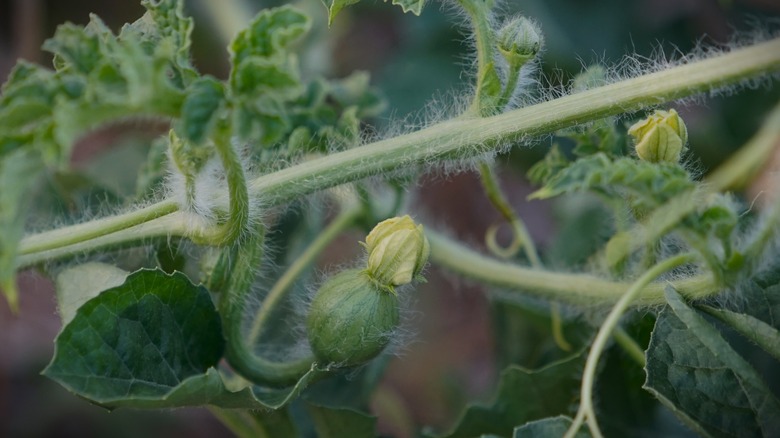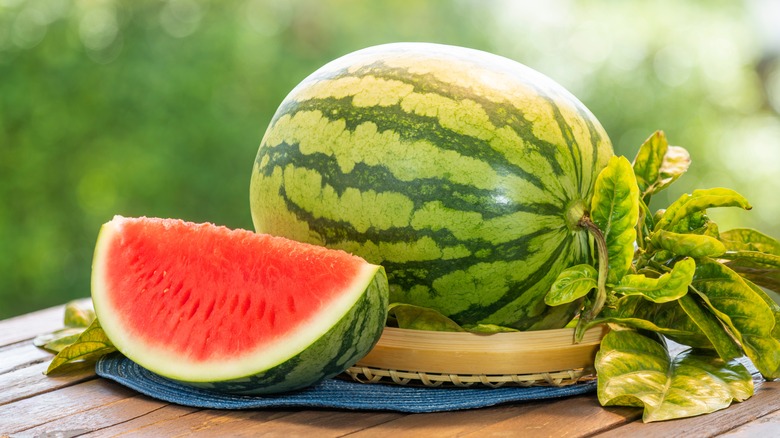Are Seedless Watermelons Considered GMOs?
GMOs are wildly controversial, and it's easy to see why. Even though they've been linked to benefits like a higher nutritional value and an increased resistance to pests, environmental stressors, and disease, there have also been concerns raised about how safe they are for human consumption. The idea of someone mucking about with the genetics of the food that we eat might feel weird or concerning, but this is the 21st century, and there's no going back now. And here's where seedless watermelons enter the picture.
The seeds are one of the challenges of eating and enjoying watermelon, so it makes sense that seedless varieties would be a big hit. But we all know plants come from seeds ... so, what gives? While it might be tempting to guess or even assume that seedless watermelons fall into the GMO category, they don't. In fact, no type of watermelon sold commercially qualifies as a GMO crop.
Although seedless watermelons may seem like a fairly new arrival to the produce aisle of your favorite grocery store, they've actually been around since 1939. That's when they were first developed in Japan, and although it took a while for the industry to get up and running, about 92% of those sold today are seedless. It turns out that while they can be considered to be genetically modified, they're definitely not GMOs. The difference is surprisingly straightforward — it's a matter of cross-breeding that can occur in nature.
How seedless watermelons are created
The term "seedless watermelon" is actually a little misleading, as these watermelons can actually contain small, soft, white seeds that you can eat along with the flesh. However, seedless watermelons are incapable of reproduction. So, how do they keep showing up among the more than 300 different types of watermelon grown in the U.S.?
They're made during a process of cross-breeding, when a 44-chromosome female watermelon plant is pollinated with the genetic material from a 22-chromosome male watermelon plant. The resulting offspring have 33 chromosomes — and no distinctive black seeds. The scientific term for the seedless watermelon is a triploid, which refers to the number of sets of chromosomes. When triploid seeds are planted and grown, they bear both male and female flowers which cannot reproduce.
The same thing happens in the animal kingdom, and it's this cross-breeding principle at work that creates often-sterile tigrons and ligers from the pairing of a lion and a tiger, and a mule from a donkey and a horse. That can happen without the interference of humans, just as seedless watermelons are pollinated without human help: When 22-chromosome plants are grown near the triploid watermelons, pollinators like bees spread that pollen, and seedless watermelons are the result.
The official definition of a GMO excludes cross-breeding
Anyone who's gotten into or witnessed an argument over GMOs has probably heard the idea that all crops are technically GMOs, because in some cases, they've been developed over generations of selective breeding for desirable traits. Although many fruits and vegetables used to look very different, the problem with that argument is that it's not what "GMO" means at all.
The process that created seedless watermelon is also called "random mutagenesis," and it's the product of two watermelon plants with a different number of chromosomes. There are two ways to fit the definition of GMO. One, the organism's DNA was altered with techniques that can happen in a laboratory setting and involve such equipment as test tubes. Two, the genetic material of different organisms has been combined in ways that would take place through traditional breeding. Neither happens in the case of seedless watermelons, so they're not GMOs. Bottom line: It's always a challenge to pick the perfect watermelon, but seedless is it.
Interestingly, there's another fruit that is surprisingly similar to the seedless watermelon that gets none of the questions, and that's the banana. Cavendish bananas are also triploid crops: They're plantains modified to have no seeds. Those tiny black dots in your bananas are the infertile seeds, and the bananas themselves come from trees grown from rhizomes that were removed from a mother tree, planted, and allowed to mature. Who would have thought?


